Justin Taylor's Blog, page 171
February 8, 2013
Limping Warriors
“For all of us the way into the promised land passes through the night, that we too only enter it as those strangely marked with scars from the struggle with God, the struggle for God’s kingdom and grace; that we enter into the land of God and of our brother as limping warriors.”
—Deitrich Bonhoeffer (DBWE 12:297)
Hyper-Calvinists Are Not the Same as Hyper Calvinists
Some critics of Calvinism persist in referring to the doctrines of grace as “hyper-Calvinism.” But as that great philosopher Inigo Montoya once said, “You keep using that word; I do not think it means what you think it means.”
A helpful introduction to the word and its historical context is Iain Murray’s book, Spurgeon v. Hyper Calvinism: The Battle for Gospel Preaching.
Phil Johnson has a helpful primer on the subject, offering a fivefold definition:
The definition I am proposing outlines five varieties of hyper-Calvinism, listed here in a declining order, from the worst kind to a less extreme variety (which some might prefer to class as “ultra-high Calvinism”):
A hyper-Calvinist is someone who either:
Denies that the gospel call applies to all who hear,
OR Denies that faith is the duty of every sinner,
OR Denies that the gospel makes any “offer” of Christ, salvation, or mercy to the non-elect (or denies that the offer of divine mercy is free and universal),
OR Denies that there is such a thing as “common grace,”
OR Denies that God has any sort of love for the non-elect.All five varieties of hyper-Calvinism undermine evangelism or twist the gospel message.
You can read the whole thing.
For more on this subject, see Iain Murray’s book, Spurgeon v. Hyper Calvinism: The Battle for Gospel Preaching.
I agree with Johnson: Hyper-Calvinism undermines the gospel and should be opposed. But it should also not be used as a label against those who explicitly repudiate it.
February 6, 2013
Advice For Parenting Young Kids
Here are 24 encouragements, with examples and explanations, on parenting young kids, from Pastor Steve McCoy:
Believe Kids Are A Blessing
Read The Jesus Storybook Bible To Them
Pray With Your Kids Concerning Taking Risks
Teach *First Time Obedience*
Give Rules For Respectful Disagreement
Give Rules For Respectful Interruption
Give Rules For Being Respectful in Public
The Five Minute Rule (Warning)
Pre-Event Preparation/Conversation
Titles of Respect for Adults (No First Names)
Use Timers
Sharing Is Not Requested, It’s Essential
Boys Treat Girls Differently Than Boys
Play Rough & Teach Kids To Get Over It
Kids Sit With You In Church
Ask Your Kids To Forgive You
Kiss Your Spouse In Front Of Them
Talking Back To Mom Is Talking Back To My Wife
Hugs & Kisses To Friends
Disagree In Front Of Your Kids
Keep/Give Away
Teach Your Kids To Sing
Teach Your Kids God Loves Them More Than You
Get In The Pool
Read the whole thing for a short explanation of each point.
Do You Know Your Neighbors’ Names?
Montgomery and Cosper:
At Sojourn, we gather large on Sundays and small in community groups and in homes throughout the week. One of our community group coaches went to visit a community group a while back, and found this tendency at work.It was a newer group at a campus that had recently launched, and the group members were eager to do something big and evangelistic. They wanted to coordinate a fall festival or cookout at the campus, inviting the neighborhood around the church to attend. The coach listened, nodding, and finally interrupted.
“These are all great ideas, but let me ask you something. What’s the guy’s name in the house next door?”
There was a long and awkward pause. Finally the group leader spoke up. “Uh, I’m not sure.”
“How ’bout across the street?” the coach asked.
This time the leader knew a first name, but when pressed further, he didn’t know the wife’s name, the kids’ names, or what the neighbor did for a living. The group had a big vision for reaching the “lost,” but they didn’t have affection for the people living just next door.
The coach, wisely, identified something all too common for us. We’re happy to put together projects and throw big events at our churches. We’re much more hesitant to befriend neighbors, share life with them, and be witnesses to grace in our ordinary, everyday interactions.
—Daniel Montgomery and Mike Cosper, Faithmapping: A Gospel Atlas for Your Spiritual Journey (Wheaton, IL: Crossway, 2013), 183.
February 5, 2013
The Truly Evangelical Type of Piety
Geerhardus Vos (1862-1949):
To join the outcry against dogma and fact means to lower the ideal of what the Christian consciousness ought normally to be to the level of the spiritual depression of our own day and generation.
How much better that we should all strive to raise our drooping faith and to re-enrich our depleted experience up to the standard of those blessed periods in the life of the Church when the belief in Bible history and the religion of the heart went hand in hand and kept equal pace, when people were ready to lay down their lives for facts and doctrines, because facts and doctrine formed the daily spiritual nourishment of the souls.
May God by his Spirit maintain among us, and through our instrumentality revive around us, that truly evangelical type of piety which not merely tolerates facts and doctrines, but draws from them its strength and inspiration in life and service, its only comfort and hope in the hour of death.
—Geerhardus Vos, “Christian Faith and the Truthfulness of Bible History,” The Princeton Theological Review (1906): 289-305.
HT: Dane Ortlund
How Much Doctrine Can One Distort or Deny and Still Be Saved?
This is a terrible first question to ask.
But it is not an illegitimate question to answer if we care about sound doctrine and the salvation of souls.
The great Puritan theologian John Owen (1616-1683) wrote:
Men may be really saved by that grace which doctrinally they do deny;
and they may be justified by the imputation of that righteousness which in opinion they deny to be imputed. (The Doctrine of Justification by Faith Alone in Owen’s Works 5:163-64)
Owen’s position seems dangerous. After all, Scripture makes a strong connection between sound doctrine and assurance. And couldn’t Owen’s position encourage doctrinal laxity?
Yes.
But not necessarily.
John Piper agrees with Owen’s assessment but adds this qualifier:
The clearer the knowledge of the truth and the more deep the denial, the less assurance one can have that the God of truth will save him. Owen’s words are not meant to make us cavalier about the content of the gospel, but to hold out hope that men’s hearts are often better than their heads. (The Future of Justification, 25 n. 30)
I think this is what J. I. Packer meant when he tries to analyze distorted doctrine from a pastoral perspective:
It is certain that God blesses believers precisely and invariably by blessing to them something of his truth and that misbelief as such is in its own nature spiritually barren and destructive.
Yet anyone who deals with souls will again and again be amazed at the gracious generosity with which God blesses to needy ones what looks to us like a very tiny needle of truth hidden amid whole haystacks of mental error. . . .
Every Christian without exception experiences far more in the way of mercy and help than the quality of his notions warrants. (Keep in Step with the Spirit, 21-22).
Jonathan Edwards offers a similar statement to Owen’s but goes into greater detail with various options regarding the denial—emphasizing how dangerous false teaching is but also hoping that such a person may be teachable when confronted with his error:
How far a wonderful and mysterious agency of God’s Spirit may so influence some men’s hearts, that their practice in this regard may be contrary to their own principles, so that they shall not trust in their own righteousness, though they profess that men are justified by their own righteousness—
or how far they may believe the doctrine of justification by men’s own righteousness in general, and yet not believe it in a particular application of it to themselves—
or how far that error which they may have been led into by education, or cunning sophistry of others, may yet be indeed contrary to the prevailing disposition of their hearts, and contrary to their practice—
or how far some may seem to maintain a doctrine contrary to this gospel-doctrine of justification, that really do not, but only express themselves differently from others;
or seem to oppose it through their misunderstanding of our expressions, or we of theirs, when indeed our real sentiments are the same in the main—
or may seem to differ more than they do, by using terms that are without a precisely fixed and determinate meaning—
or to be wide in their sentiments from this doctrine, for want of a distinct understanding of it;
whose hearts, at the same time, entirely agree with it, and if once it was clearly explained to their understandings, would immediately close with it, and embrace it:—
how far these things may be, I will not determine; but am fully persuaded that great allowances are to be made on these and such like accounts, in innumerable instances; though it is manifest, from what has been said, that the teaching and propagating [of] contrary doctrines and schemes, is of a pernicious and fatal tendency. (“Justification by Faith Alone,” in Yale’s Works of Jonathan Edwards 19:242.)
In a recent post on this subject, Michael Horton quotes the Reformed theologian Herman Witsius who thought carefully about this:
To point out the articles necessary for salvation, and precisely to determine their number, is a task, if not utterly impossible, at least extremely difficult. . . .
It does not become us to ascend into the tribunal of God, and to pronounce concerning our neighbor, for how small a defect of knowledge, or for how inconsiderable and error, he must be excluded from heaven. It is much safer to leave that to God. It may not be safe and expedient for us to receive into church-fellowship a person chargeable with some error or sin; whom, however, we should not dare, on account of that error or sin, to exclude from heaven. (Sacred Dissertations on the Apostles’ Creed, Vol. 1. Grand Rapids: Reformation Heritage Books, 2010, 16, 27-29)
Horton offers his own conclusion:
Paul reminds all of us with Timothy that only the Lord knows his elect. Pastors and elders in council may approve valid professions of faith and guard the ministry of preaching, sacrament, and discipline, but only the Great Shepherd can separate the sheep from the goats on the last day. Until then, our calling is to entrust ourselves to faithful shepherds and to long earnestly and prayerfully for the repentance of those who have strayed from Christ’s Word.
For more on this, see Horton’s posts “How Much Do I Need to Know?” “How Far Is Too Far?” He is especially helpful in identifying two common errors: (1) assuming that we only need to know the bare minimum that is necessary for salvation; (2) assuming that we need to know everything correctly in order to be saved.
February 4, 2013
Happy 100th Birthday, Mrs. Parks
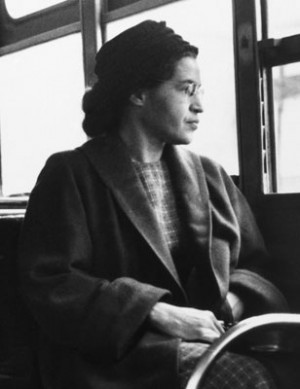 Today would have been the 100th birthday of Rosa Parks, Civil Rights heroine. The definitive biography has recently been published: The Rebellious Life of Mrs. Rosa Parks, by Jeanne Theoharis, a Brooklyn College political science professor. Charles Blow, writing in the New York Times, provides a summary: “It argues that the romanticized, children’s-book story of a meek seamstress with aching feet who just happened into history in a moment of uncalculated resistance is pure mythology.”
Today would have been the 100th birthday of Rosa Parks, Civil Rights heroine. The definitive biography has recently been published: The Rebellious Life of Mrs. Rosa Parks, by Jeanne Theoharis, a Brooklyn College political science professor. Charles Blow, writing in the New York Times, provides a summary: “It argues that the romanticized, children’s-book story of a meek seamstress with aching feet who just happened into history in a moment of uncalculated resistance is pure mythology.”
Below is an earlier write-up I posted trying to summarize that fateful day in 1955 when she refused to move her seat on the bus, and what happened in the days after her actions.
On a cool Thursday morning, December 1, 1955, a 42-year-old seamstress named Rosa Parks boarded a segregated bus in Montgomery, Alabama, on her way to work at the Montgomery Fair Department Store, about five miles from her apartment complex—just as she did every weekday morning.
 At the end of the workday—around 6 PM—she boarded the bus for her return trip home.
At the end of the workday—around 6 PM—she boarded the bus for her return trip home.
Contrary to some perceptions, she was not sitting in the “White’s Only Section,” but was rather in the middle neutral section with its floating cut-off line (indicated by a movable sign), depending on the number of white passengers.
Three stops later, her actions would set in motion what has been called “the greatest nonviolent revolution in American history (one of the greatest in all history).”
Pulitzer-Prize winning historian Taylor Branch picks up the story in the first volume of his magisterial series on America in the King Years. Describing Rosa Parks as “a tireless worker and churchgoer, of working class station and middle-class demeanor,” he writes:
All thirty-six seats of the bush she boarded were soon filled, with twenty-two Negroes seated from the rear and fourteen whites from the front.

Wikipedia: "The No. 2857 bus which Rosa Parks was riding on before she was arrested (a GM transit bus, serial number 1132). She was sitting in the 2nd row from the front, all the way to the right window (looking from the back)."
Driver J. P. Blake, seeing a white man standing in the front of the bus, called out for the four passengers on the row just behind the whites to stand up and move to the back.
Nothing happened.
Blake finally had to get out of the driver’s seat to speak more firmly to the four Negroes.
“You better make it light on yourselves and let me have those seats,” he said.
At this, three of the Negroes moved to stand in the back of the bus, but Parks responded that she was not in the white section and didn’t think she ought to move. She was in no-man’s-land.
Blake said that the white section was where he said it was, and he was telling Parks that she was in it. As he saw the law, the whole idea of no-man’s-land was to give the driver some discretion to keep the races out of each other’s way. He was doing just that.
When Parks refused again, he advised her that the same city law that allowed him to regulate no-man’s-land also gave him emergency police power to enforce the segregation codes. He would arrest Parks himself if he had to.
Parks replied that he should do what he had to do; she was not moving.
She spoke so softly that Blake would not have been able to hear her above the drone of normal bus noise. But the bus was silent.
Blake notified Parks that she was officially under arrest. She would not move until he returned with the regular Montgomery police.
Here is audio of Mrs. Parks a few months later (April 1956) recounting the story:
Mrs. Parks was not the first to refuse to move, nor the first to be arrested. But leaders like E. D. Nixon needed a “test case” to challenge the system, and Mrs. Parks—with an impeccable reputation and a quiet demeanor—was the ideal candidate. He bailed her out of jail that night.

That evening the idea for a one-day bus boycott was hatched, and with Rosa Parks’s permission Jo Ann Robinson—an Alabama State College professor and head of the Woman’s Political Council—secretly used her school’s mimeograph machine to produce 35,000 handbills calling for a boycott of the Montgomery bus system:
This is for Monday, December 5, 1955
Another woman has been arrested and thrown in jail because she refused to get up out of her seat on the bus for a white person to sit down.
It is the second time since the Claudette Colvin case that a Negro woman has been arrested for the same thing. This has to be stopped.
Negroes have rights too, for if Negroes did not ride the buses, they could not operate. Three-fourths of the riders are Negro, yet we are arrested, or have to stand over empty seats. If we do not do something to stop these arrests, they will continue. The next time it may be you, or your daughter, or mother.
This woman’s case will come up on Monday. We are, therefore, asking every Negro to stay off the buses Monday in protest of the arrest and trial. Don’t ride the buses to work, to town, to school, or anywhere on Monday. You can afford to stay out of school for one day if you have no other way to go except by bus. You can also afford to stay out of town for one day. If you work, take a cab, or walk. But please, children and grown-ups, don’t ride the bus at all on Monday. Please stay off all buses Monday.
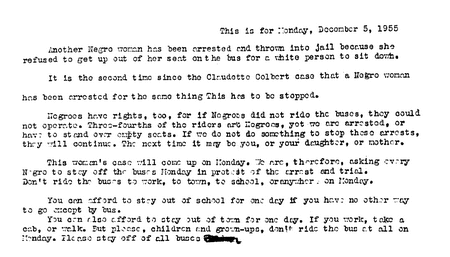
The idea of contacting—much less convincing—40,000 people about anything seemed an almost impossible task, especially in pre-social media days. But word quickly spread as the handbills were distributed to students leaving school on Friday, and the local black churches were mobilized as word continued to spread on Sunday.
On Monday morning, December 5, after a brief trial, Mrs. Parks was found guilty and fined $14. Her lawyer appealed to the state court.
The entire city watched in amazement as empty buses like this one rolled along their routes:
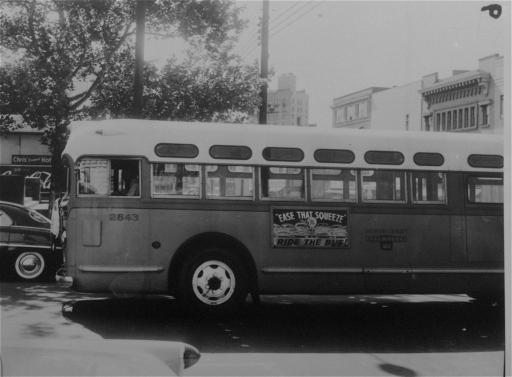
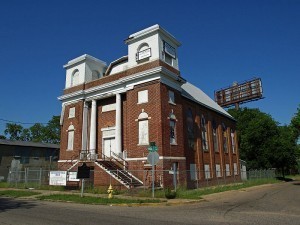 That afternoon, at 3 PM, a group of leaders met at Mt. Zion AME Zion Church to discuss extending the boycott beyond that day and to plan a mass gathering that evening at Holt Street Baptist Church, in the working-class district of Montgomery. During that meeting they formed the Montgomery Improvement Association (MIA), electing as president the young pastor of Dexter Avenue Baptist Church—Martin Luther King Jr. Just 26 years old, he was 15 months into his first pastorate.
That afternoon, at 3 PM, a group of leaders met at Mt. Zion AME Zion Church to discuss extending the boycott beyond that day and to plan a mass gathering that evening at Holt Street Baptist Church, in the working-class district of Montgomery. During that meeting they formed the Montgomery Improvement Association (MIA), electing as president the young pastor of Dexter Avenue Baptist Church—Martin Luther King Jr. Just 26 years old, he was 15 months into his first pastorate.
King only had 20 minutes or so to prepare his speech. Well before the proceedings began the spacious church overflowed with several thousand people—in the sanctuary, in the balconies, in the basement, and lining the streets outside to listen via loudspeakers.
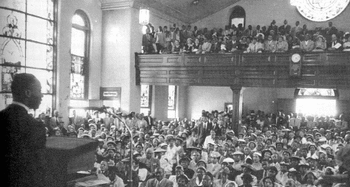 Thundering applause and sustained cheering erupted when King said the following:
Thundering applause and sustained cheering erupted when King said the following:
And you know, my friends, there comes a time when people get tired of being trampled over by the iron feet of oppression.
There comes a time, my friends, when people get tired of being plunged across the abyss of humiliation, where they experience the bleakness of nagging despair.
There comes a time when people get tired of being pushed out of the glittering sunlight of life’s July and left standing amid the piercing chill of an alpine November.
There comes a time.
Here is the only audio excerpt I’ve been able to locate—a clip that follows shortly after the excerpt above—though the recording isn’t of great quality:
The boycott made a serious economic impact on the city of Montgomery with its near-empty buses, and required extraordinary discipline, organization, and sacrifice among the black residents of Montgomery. It was not without cost to the black citizens of Montgomery. For example, the Kings’s house was bombed and he spent two weeks in jail.
Mother Pollard, an 80-year-old matriarch, was asked at a mass meeting how she was doing, and her answer summed up the feeling of many: “My feets is tired, but my soul is rested.”
On November 13, 1956, the Supreme Court upheld a federal district court’s ruling that Alabama’s segregation laws were unconstitutional, thereby allowing black bus passengers to sit wherever they wanted. The boycott officially ended December 20, 1956, having lasted for an amazing 381 days. Through non-violent means a revolution was well underway.
If you want a great film on the Montgomery Bus Boycott which accurately and compellingly tells the story above in more details, check out the HBO Film Boycott (2001). You can watch a trailer here.
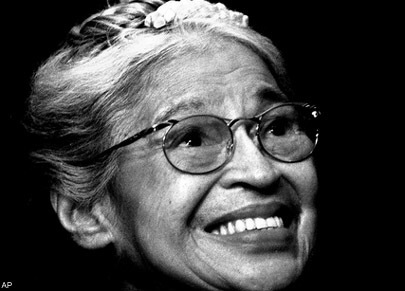
Free Livestream of the Desiring God Conference for Pastors
You can watch the DG pastors’ conference online for free. The schedule is below (all central time zone).
Monday, February 4
1:30 – 2:30 PM, Mark Dever
Centrality of the Church in Disciple-Making
3:00 – 4:00 PM, Seminar with Mark Dever
Connecting the Dots Between Shepherding, Disciple-Making and Meaningful Membership
7:30 – 8:30 PM, Kent Hughes
Liberating Ministry from the Success Syndrome—26 Years Later
Tuesday, February 5
9:00 – 10:00 AM, Jason Meyer
Pastoral Transition after a 32-Year Ministry: Strategy and the Supernatural
10:30 – 11:30 AM, Tope Koleoso
Sovereign Grace, Spiritual Gifts, and the Pastor: How Should a Reformed Pastor Be Charismatic?
1:45 – 3:00 PM, John Piper
The Pastor-Shepherd as Poet and Prophet: Thoughts from the Life and Poetry of George Herbert
7:30 – 8:30 PM, Darrin Patrick
Do the Work of An Evangelist: Evangelism, As Though Conversion Were Supernatural
Wednesday, February 6
9:00 – 10:00 AM, Mack Stiles
Supernatural World Missions: “With Man This Is Impossible”
10:30 – 11:30 AM, Speaker Panel
Hughes, Patrick, Koleoso, Stiles, Meyer, Piper
February 1, 2013
Remembering All Four Elements of Our Identity in Christ
If all I hear is that I am a son and a saint, I may become flippant about sin and negligent of duty.
However, if I err in the other direction, I may sink into the Slough of Despond. If all I hear is that I am a miserable wretch of a sinner, then I am unlikely to experience the joy of forgiveness: justification, adoption, and the certainty of eternal life.
If all I hear is that I am a servant, then God may become to me an oppressive taskmaster, whose presence is avoided because an awareness of God means still another task added to my already overburdened job description.
You can read the whole thing here.
HT: Carl Trueman
January 31, 2013
The First Full-Scale Biography of Abraham Kuyper in English
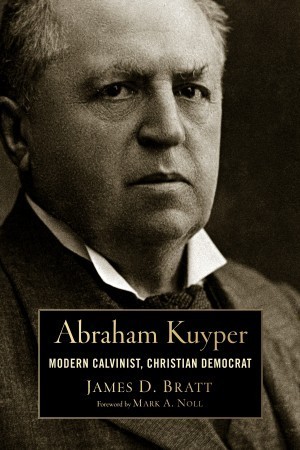 In April of 2013 Eerdmans will publish James Bratt’s Abraham Kuyper: Modern Calvinist, Christian Democrat in their Library of Religious Biography Series, with a foreword by Mark Noll.
In April of 2013 Eerdmans will publish James Bratt’s Abraham Kuyper: Modern Calvinist, Christian Democrat in their Library of Religious Biography Series, with a foreword by Mark Noll.
Here is a description:
In this first full-scale English biography of Abraham Kuyper, the highly influential religious and political leader of Dutch Calvinists in the late nineteenth and early twentieth century, historian James D. Bratt draws connections between the life and thought of Kuyper and current debates in America today. Bratt’s study covers Kuyper’s early years, his development as a person, his various leadership roles and spheres of influence, and the considerable ongoing impact of his ideas.
A convinced Calvinist and a distinctly modern public figure, Kuyper held a wide variety of roles over the course of his life — minister, newspaper editor, educational innovator, politician, religious reformer, and prime minister of the Netherlands (1901-1905). Kuyper’s life demonstrates how devotees of any faith can carry on a responsible public life in contention — and concert — with people of other convictions.
Justin Taylor's Blog
- Justin Taylor's profile
- 44 followers




